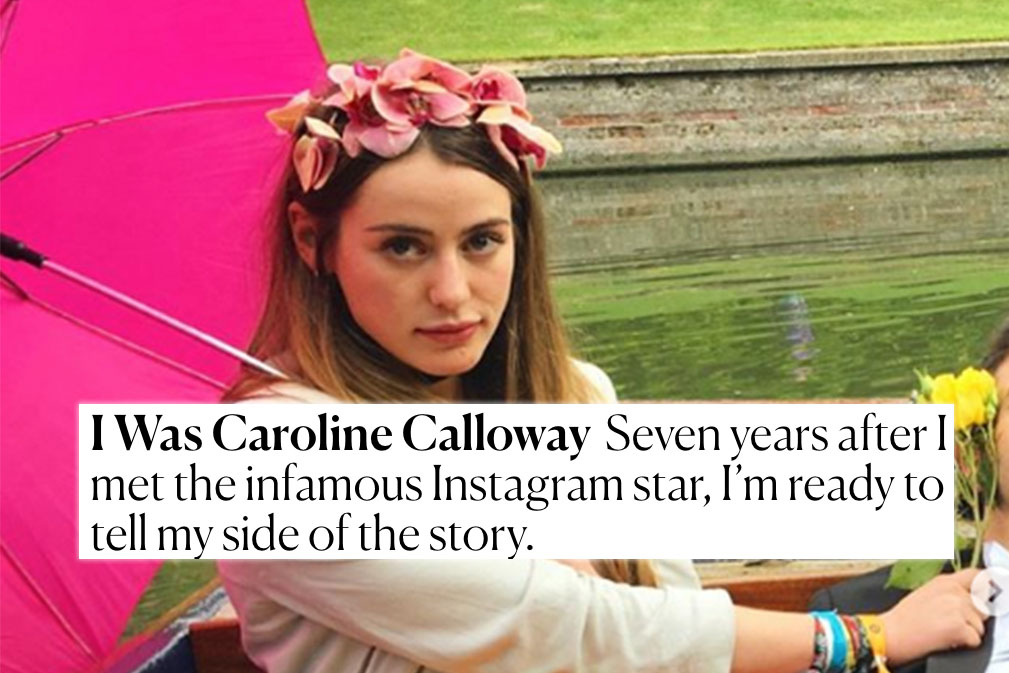
If you know the name Caroline Calloway you’re probably already across the endless drama that has circled the influencer/artist/creator over the last few years.
Disastrous meet and greets, thousands of empty mason jars, and a $350,000 USD book deal ultimately crashed. This is the legacy of an influencer and creator once described as Cambridge’s “most controversial Instagram celebrity.”
But a new chapter in the life of Calloway was added on Wednesday, when a long-anticipated essay, written by Calloway’s ghostwriter of five years, was finally published.
https://twitter.com/Nat_Beach/status/1171546345376636928
Natalie Beach, a writer out of New York, finally spoke out about what it was like to work with and live within Calloway’s circle for years, offering an insight into influencer culture that is rarely, if every, put out on paper.
In her essay, Beach recounts how she went from friend to sounding board to a gaslit emotional prop, constantly drawn in by Calloway’s approach to life: one of only glamour, success, and positive vibes.
For those only learning of Calloway now here is just a short list of the things she has done: built up a huge online following on Instagram off the back of long captions she called “memoirs”, signed a huge money book deal before pulling the plug on it citing the proposal was sexist, focusing too heavily on romance (“I would apologise but I do not think that it is my fault for being born into a culture that equates artistic success with financial success”), and hosting a nation-wide workshop series before venues had been booked that went on to be riddled with canceled events, nixed promises of Calloway-made salad, and a series of questions asked on Instagram with answers that only equated to a longwinded “yes”, like asking attendees if she should cancel faraway dates and move them to NYC with only “This is our spot” and “Fuck yes” as options.
https://www.instagram.com/p/B1rwd4cBihz/
But to understand the true importance of these multiple, wild, and bizarre shortcomings one must also understand the appeal of Calloway. She is, as Kayleigh Donaldson wrote in PAJIBA, “the sloppiest and most obviously incompetent version of the influencer economy run amok.”
The so-called influencer economy is built by women like Calloway, those in the upper echelons of societal and financial privilege who create unfeasible fantasies of capitalism under the guise of being ‘real’, all to shill it to the highest bidder. She may not be selling tea that makes you sh-t yourself or obsessing over avocados, but the intent is the same.
This is all why when news broke that there might be an essay circling New York media, written by the only woman with insight into Calloway’s formative influencer years other than herself, the internet buzzed with anticipation. And, depending on who you talk to, it delivered.
Here’s a rundown of what Beach claims in her essay:
- That she gifted some plates stamped with the Yale crest to Calloway for her 21st birthday, after which Calloway broke down in tears before later claiming someone had stolen them.
- That she fell into the role of taking photos of Calloway for her Instagram.
- That Calloway had paid for a flight for her to return home after the pair were stranded in Milan, and that she then offered to edit Calloway’s Instagram to pay her back.
- The she asked to sublet Calloway’s apartment while she was adventuring, and was originally told yes before being told it needed to be rented as an Airbnb and that she could manage it or clean it up for cash.
- That she was asked by Calloway to become a paid editor of her book and proposal in a blurry haze involving drugs and a burrito.
- That Calloway had troubles with addiction.
- And that Calloway had confessed to her that she had bought tens of thousands of her followers.
Since its publication there has been division about the worth of the essay – whether it was cruel, whether it was necessary, that it was depressing, and if it served a purpose at all.
Some responded to passages saying they felt it deep within themselves, so familiar and true to anyone that has experienced a toxic friendship. Some questioned the cultural push to swarm over Calloway, a young woman who appeared to have had serious addiction problems. Others, who had spent weeks waiting for the essay and months if not years following Calloway, just bathed in the chaos of it all.
Regardless of the worth in writing about Calloway, and in writing about experiences that are clamoured after for reasons we’d prefer to believe we’re better than, the saga is a microcosm of a celebrity culture that has already been formed. The influencer is still relatively new, with lower barriers to entry and a more user-controlled experience. The response to Beach’s essay, and the criticism of its worthiness, may well be a broader discussion had repeatedly, as a new generation grapples with a form of celebrity it created.
After the essay was published Calloway continued her online publicity tour: the URL for the essay now sits in her Instagram bio, right underneath the reminder: “No, not that one. The other scam. The one you love.” She has posted a screenshot of the essay, calling out a typo she later corrects is just the title of the piece. “I just have a lot going on right now,” she writes, “I’m not processing sharply.” Her comments are threaded with people checking up on her, adorned with love heart emojis and praise for Calloway’s apparent vulnerability.
“When I finally get cancelled,” reads a tweet posted to her Instagram, “I want it to be at home, in my bedroom, surrounded by friends.”
At this point, a movie is almost inevitable. A response piece from Calloway, by way of an interview with The New York Times’ Taylor Lorenz, has already been announced.
https://www.instagram.com/p/B2QJ8vOBgm8/
Beach, for her part, has kept it short: a single tweet embedding her essay, retweeted hundreds of times, her following increasing by the thousand. Everything she wanted to say has been said. But both she and Calloway will be entwined forever now, as much a part of each other’s pain as the probable successes that will trickle out. As of today, both have been used by the other: whether any of it is warranted is a question that will play out over time.
Still, there is empathy in Beach’s writing, so aware of the impact Calloway has had on herself and on others. “This is why,” she writes, “when people ask me if Caroline is a scammer, I try to explain that if she is, her first mark is always herself.”
Perhaps now both Calloway and Beach will get what they want: recognition, reward, and the worldwide knowledge that They Did This Themselves. At the very least, they are now both in control of their own message.



